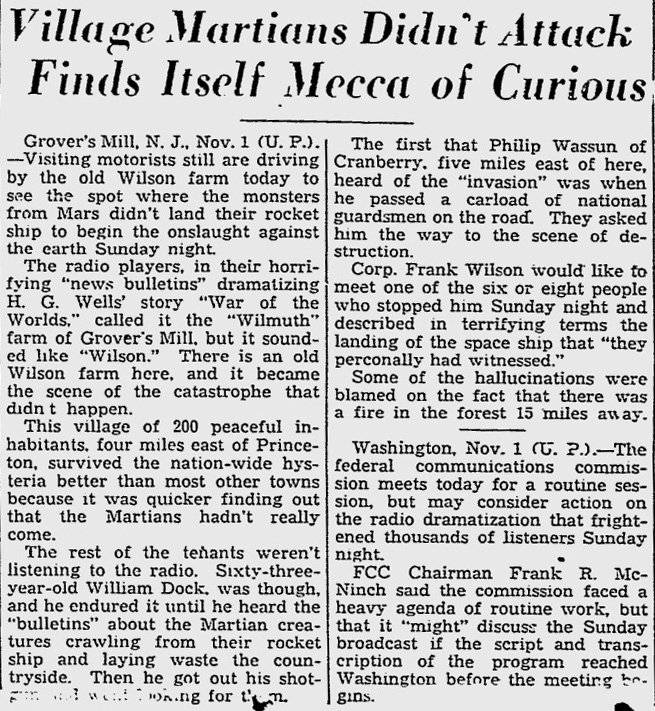75 years ago today, this radio play led to hysteria
Listen to the original broadcast at one of the links below

November 1, 1938 - Youngstown Vindicator | Article about the location where monsters from Mars landed, according to the radio broadcast of War of the Worlds.
By EMMALEE C. TORISK
etorisk@vindy.com
Seventy-five years ago today, it was a typical Sunday night in Western Pennsylvania.
It would not remain typical for long.
“Blue laws” ensured that no stores or theaters were open, so Ted Heineman, then 10, and his family tuned in as usual to the CBS radio program “Mercury Theatre on the Air.”
At 8 p.m., the program began with a broadcast of dance music, performed live by Ramon Raquello and his orchestra from the Meridian Room of New York City’s Hotel Park Plaza.
Minutes later, with the orchestra in the midst of “La Cumparsita,” an announcer broke into the broadcast, relaying the news that explosions of incandescent gas had been spotted on Mars.
Then, in another interruption, came word that a “huge, flaming object, believed to be a meteorite” had fallen on a farm in New Jersey, and that something “large as a bear” and glistening “like wet leather” — an alien — had begun to emerge from it.
The news bulletins only intensified from that point, with announcers reporting “martian cylinders” falling all across the country.
The end of humanity was near.
“I realized it was fake,” said Heineman, of Poland, now 85. “My parents were listening, too, and they said, ‘That can’t be.’ They seemed to realize it was a hoax.”
But others were thoroughly convinced that the U.S. was actually under attack by martians, having missed, or ignored, the opening disclaimer stating that the highly realistic radio play was simply an adaptation of H.G. Wells’ “War of the Worlds,” written 40 years earlier.
To hear the broadcast, click here.
Disclaimers popped up throughout the hour-long broadcast. At its conclusion, too, Mercury Radio Theatre host Orson Welles even stepped out of character to assure the audience that the broadcast “has no further significance than the holiday offering it was intended to be.”
In previous weeks, the Mercury Theatre group had performed dramatizations of other classic novels, like “Treasure Island” and, just a week before, “Around the World in 80 Days.”
This original dramatization of “War of the Worlds,” however, caused a nationwide panic.
“People hadn’t been paying much attention, but it got their attention real fast,” Heineman said. “In western Pennsylvania, where I lived then, we weren’t too concerned that there were creatures in New Jersey. But the people in the area where it was taking place were convinced that something was happening.”
According to an International News Service article titled “Here’s How Americans Carry On When Men of Mars ‘Attack’ U.S.”, which appeared in The Youngstown Vindicator on the following Monday, Samuel Tisman of New York “grabbed a few belongings and ran for the elevator,” joining “hundreds of people” milling around in panic in the streets.
Lous Winkler of the Bronx, who tuned in halfway through the broadcast, nearly had a heart attack when the “Secretary of the Interior” was introduced. Winkler said he “‘was convinced it was the [real] McCoy’” and “‘ran out into the street with scores of others.’”
An unidentified Brooklyn man, along with other alleged “eyewitnesses of the disaster,” reported hearing gunfire from battles with the martians and demanded a gas mask, arguing “I’m a taxpayer.”
The Vindicator also reported that frightened listeners flooded the WKBN switchboard with more than 30 calls in 45 minutes.
In an article titled “Drama Jams Phones Here,” a man from Ravenna called the radio station to report that he’d just arrived home from work, but that “he and his family were ready to ‘evacuate.’”
A woman told WKBN’s engineer that she “had her pen in hand, ready to make her will.”
The Vindicator newsroom, too, received several calls “demanding to know if the program was a news broadcast.”
Walter Mathews, an associate professor of telecommunication studies at Youngstown State University, said, however, that stories of the panic that arose during the “War of the Worlds” broadcast are greatly exaggerated.
Referencing “The Invasion from Mars: A Study in the Psychology of Panic,” written by social scientist Hadley Cantril, Mathews explained that contrary to legend, there really weren’t a lot of suicides, or traffic jams, or even increased calls to police departments, except in New Jersey, where the invasion supposedly took place.
Mathews acknowledged, though, that the world in late 1938, when it was clear that another world war was imminent, was an uncertain place — and was also a time when radio had a lot more power than it does today.
“People really trusted it,” Mathews said. “We live in a much more cynical age, and it’s hard for us to understand the trust people had in radio, and later on in television.”
Dr. John Cox, a physician and local theater enthusiast, conducted a live – and localized – broadcast of “War of the Worlds” at WKBN studios in 2009 and said he found it both refreshing and encouraging that some listeners actually bought into the story of the martian invasion, as in 1938.
It demonstrated that such a simple way of storytelling could still make a difference, Cox said.
“People are more jaded now, but it was a little bit different in those days. [Radio] was their whole source,” he said. “This was a way of going back a little bit to the ‘old school,’ a way for people to still use their imaginations.”
 43
43
